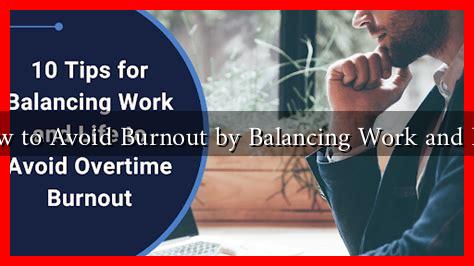-
Table of Contents
How to Avoid Burnout by Balancing Work and Life
In today’s fast-paced world, the line between work and personal life has become increasingly blurred. With the rise of remote work and constant connectivity, many individuals find themselves struggling to maintain a healthy balance. This imbalance can lead to burnout, a state of emotional, physical, and mental exhaustion caused by prolonged stress. According to a study by Gallup, 76% of employees experience burnout on the job at least sometimes. This article explores effective strategies to avoid burnout by achieving a better work-life balance.
Understanding Burnout
Burnout is not just a buzzword; it is a serious condition that can affect anyone, regardless of their profession. The World Health Organization (WHO) classifies burnout as an occupational phenomenon, characterized by three dimensions:
- Feelings of energy depletion or exhaustion: Individuals may feel drained and unable to cope.
- Increased mental distance from one’s job: A sense of cynicism or detachment can develop.
- Reduced professional efficacy: Individuals may feel less competent and productive.
Recognizing the signs of burnout is the first step toward prevention. Common symptoms include chronic fatigue, irritability, lack of motivation, and decreased job performance.
Strategies for Achieving Work-Life Balance
To combat burnout, it is essential to implement strategies that promote a healthy work-life balance. Here are some effective approaches:
1. Set Clear Boundaries
Establishing boundaries between work and personal life is crucial. This can be achieved by:
- Defining specific work hours and sticking to them.
- Creating a dedicated workspace, even if working from home.
- Communicating your availability to colleagues and supervisors.
For example, a study published in the Journal of Occupational Health Psychology found that employees who set clear boundaries reported lower levels of stress and higher job satisfaction.
2. Prioritize Self-Care
Self-care is not a luxury; it is a necessity. Engaging in activities that promote physical and mental well-being can significantly reduce stress levels. Consider the following:
- Regular exercise, which has been shown to reduce anxiety and improve mood.
- Mindfulness practices, such as meditation or yoga, to enhance emotional resilience.
- Maintaining a healthy diet to fuel your body and mind.
According to the American Psychological Association, individuals who practice self-care are better equipped to handle stress and avoid burnout.
3. Foster Supportive Relationships
Building a strong support network can help mitigate feelings of isolation and stress. This can include:
- Connecting with colleagues for professional support.
- Spending quality time with family and friends to recharge emotionally.
- Seeking mentorship or counseling when needed.
A case study from the University of California found that employees with strong social support reported lower levels of burnout and higher job satisfaction.
4. Embrace Flexibility
Flexibility in the workplace can lead to increased job satisfaction and reduced stress. Employers can support this by:
- Offering flexible work hours or remote work options.
- Encouraging employees to take regular breaks throughout the day.
- Promoting a culture that values work-life balance.
Research from Stanford University indicates that flexible work arrangements can lead to higher productivity and lower burnout rates.
Conclusion
Avoiding burnout is essential for maintaining both personal well-being and professional effectiveness. By setting clear boundaries, prioritizing self-care, fostering supportive relationships, and embracing flexibility, individuals can create a healthier work-life balance. Remember, it is not just about working hard; it is about working smart and taking care of yourself along the way. For more resources on managing stress and preventing burnout, consider visiting the American Psychological Association.
In summary, recognizing the signs of burnout and implementing these strategies can lead to a more fulfilling and balanced life, ultimately enhancing both personal happiness and professional success.

